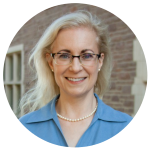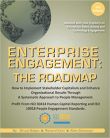WORC: Worthwhile Jobs Are a Path to Alpha for Investors
To the Founders of WORC (for Workforce & Organizational Research Center), good jobs are better for employees, investors and for all stakeholders. Her company offers a complete suite of services for not-for-profits, investment firms, and the companies they own to profit from her organization’s Worthwhile Jobs FrameworkTM.

As any proponent of Stakeholder Capitalism, Dr. Ellen G. Frank-Miller, Ph.D., Founder and Chief Scientific Officer of Chicago-based WORC sees a direct connection between job quality and organizational success.
“We envision an economy in which every worker has a job worth having,” says Dr. Frank-Miller. She believes it’s possible because organizations who make jobs better-paying and more meaningful with opportunities for employees to contribute to the company’s success achieve enhanced results financially and in terms of quality of life for stakeholders.
 She says her organization promotes job quality in several ways. WORC conducts research and evaluation for non-profit demonstration projects on effective practices in job quality design in general and in specific market segments and helps investment firms achieve greater return on their holdings through the benefit of having a worthwhile jobs strategy. Besides the social benefits, organizations that improve lower-level job quality provide an “alpha” return along with a double bottom line for investors because of, she says, the following factors: increased sales as a result of more referrals and customer retention, reduced expenses for recruitment, fewer product and service failures, fewer accidents, etc.
She says her organization promotes job quality in several ways. WORC conducts research and evaluation for non-profit demonstration projects on effective practices in job quality design in general and in specific market segments and helps investment firms achieve greater return on their holdings through the benefit of having a worthwhile jobs strategy. Besides the social benefits, organizations that improve lower-level job quality provide an “alpha” return along with a double bottom line for investors because of, she says, the following factors: increased sales as a result of more referrals and customer retention, reduced expenses for recruitment, fewer product and service failures, fewer accidents, etc.
After decades of scientific research going back to the 1930s, the focus on “good jobs” was popularized by Zeynep Ton, a M.I.T. professor who first published her book The Good Jobs Strategy and who went on to create the Good Jobs Institute.
The Importance of Having CEOs Who Care
One study WORC conducted recently in partnership with the National Fund for Workforce Solutions with generous support from the Bill & Melinda Gates Foundation found that small to mid-sized business owners willing to adopt practices that improved job quality were driven by personal values; a belief it’s the right thing to do; their ability to identify with the lives of workers, and a knowledge that there are ways to make jobs better. The biggest challenge to scaling better practices, she says, is to spread adoption through awareness, which she believes is only possible through “diffusion, getting one company to focus on worthwhile jobs with positive results so that others see the benefits through solid data.”
The next part of the study, she explains, was to synthesize decades-worth of scientific evidence that establishes the correlation between job quality and key performance measures (KPIs), such as reducing turnover and enhancing engagement. Involving an analysis of over 3,000 peer-reviewed studies, Dr. Frank-Miller and her team created the Job Quality Maps. She says the model outlines a clear correlation between job quality and bottom-line benefits. “Our approach is to help employers understand the factors that will actively matter to their employees…To make sure what they do is based on rigorous analysis.” The Job Quality Maps provide companies with a starting point to align their efforts to make jobs better with business imperatives – they are a comprehensive visualization of ways to make frontline jobs better for competitive advantage.” Her company applies this framework along with its Worthwhile Jobs Index ScoreTM to help organizations baseline their performance, identify areas of improvement, establish a plan, and measure the results.
The third stage of the study involved tracking the results of job design efforts of five small to mid-sized businesses in five US cities, starting with a baseline measure and evaluating outcomes. For example, at one small restaurant chain in Baltimore, management wanted to make jobs better by increasing pay but couldn’t afford to raise hourly wages. Instead, they instituted a gainsharing program where employees at stores that exceeded profit targets would receive a cash payout for a portion of the gains. The change in employee engagement in business results was dramatic. “In the very first quarter of the program, as people enjoyed getting gainsharing dollars, they immediately became more interested in receiving weekly financial data to see how they were doing toward reaching profit goals. We’re talking about baristas, servers, and dishwashers – not store managers.”
Worthwhile Jobs Go Way Beyond Task Design
In WORC’s world, worthwhile jobs are defined as providing a sense of purpose and satisfaction, diversifying tasks to break up monotony, creating a sense of empowerment and opportunity to be heard by management, offering rewards and recognition, providing a career path--all of which and more can contribute to the employee experience that if properly crafted creates the desired productivity, quality, retention, referral, cultural, social, and other benefits.
According to Dr. Frank-Miller, her company’s projects have so far included:
• A collaborative that’s designing better jobs to recruit and retain Chicago retail employees.
• A pilot program to help small businesses pivot and build back after the pandemic.
• A community-level effort to change job design and measure the business effects.
• A program to respond to new economic challenges and long-standing conditions, including racial inequities.
• A program to create career pathways within the service sector.
Her focus now, she says, is continuing her work with not-for-profits’ demonstration projects to help specific industries identify effective work quality practices and scaling the methodologies to benefit individual business through affiliations with private equity and venture capital organizations seeking to achieve enhanced returns for their holdings through job quality strategies.
Dr. Frank-Miller says she has spent her 30-year career collaborating with employers, national advocates, and community-based organizations to help make frontline jobs better and more accessible to all people. She founded WORC in 2021 “to help achieve the vision of an economy where every worker has a job worth having.” She describes herself as an organizational scholar by training with a focus on “conducting rigorous evaluation and mixed-methods research to create scientific evidence that partners can put into action.” She says she is guided by extensive HR consulting experience and social work training, with extensive experience and relationships with non-profit and for-profit partners, gaining insight into their pressing priorities and challenges, and helping them achieve organizational, employee, and community goals.
For More Information
Ellen Frank-Miller, Founder, Chief Scientific Officer
WORC
Click here to get ESM news delivered each week.
Master the “S” of Environmental, Social, Governance (ESG), A.k.a. Stakeholder Capitalism
The Enterprise Engagement Alliance at TheEEA.org is the world’s first and only organization that focuses on outreach, certification and training, and advisory services to help organizations achieve their goals by fostering the proactive involvement of all stakeholders. This includes customers, employees, distribution and supply chain partners, and communities, or anyone connected to an organization’s success.
Training and Thought Leadership
- Founded in 2008, the Enterprise Engagement Alliance provides outreach, learning and certification in Enterprise Engagement, an implementation process for the “S” or Social of Stakeholder Capitalism and Human Capital Management and measurement of engagement across the organization.
- The Enterprise Engagement Alliance provides a training and certification program for business leaders, practitioners, and solution providers, as well as executive briefings and human capital gap analyses for senior leaders.
- The EEA produces an education program for CFOs for the CFO.University training program on Human Capital Management.
- Join the EEA to become a leader in the implementation of the “S” of ESG and Stakeholder Capitalism.
- The ESM information portal and The Enterprise Engagement Advisors Network solution provider marketplace cover all aspects of stakeholder engagement, and the EEA information library lists dozens of resources.
- The RRN information portal and Brand Media Coalition marketplace address the use of brands for gifting, incentives, recognition, and promotions. The BMC information library provides information and research resources.
Video Learning
The EEA Human Capital Management and ROI of Engagement YouTube channel features a growing library of 30- to 60-minute panel discussions with leading experts in all areas of engagement and total rewards.
- Enterprise Engagement for CEOs: The Little Blue Book for People-Centric Capitalists. A quick guide for CEOs.
- Enterprise Engagement: The Roadmap 5th Edition implementation guide. A comprehensive textbook for practitioners, academics, and students.
Enterprise Engagement Advisory Services
The Engagement Agency helps:
- Organizations of all types develop strategic Stakeholder Capitalism and Enterprise Engagement processes and human capital management and reporting strategies; conduct human capital gap analyses; design and implement strategic human capital management and reporting plans that address DEI (Diversity, Equity, and Inclusion), and assist with managed outsourcing of engagement products and services.
- Human resources, sales and marketing solution providers profit from the emerging discipline of human capital management and ROI of engagement through training and marketing services.
- Investors make sense of human capital reporting by public companies.
- Buyers and sellers of companies in the engagement space or business owners or buyers who seek to account for human capital in their mergers and acquistions.
For more information: Contact Bruce Bolger at Bolger@TheICEE.org or call 914-591-7600, ext. 230.















